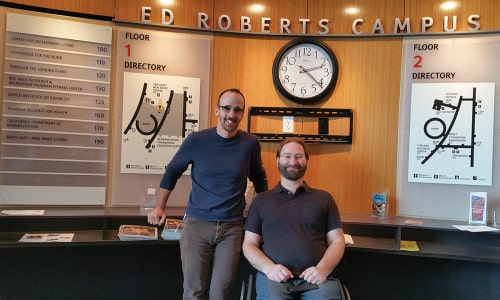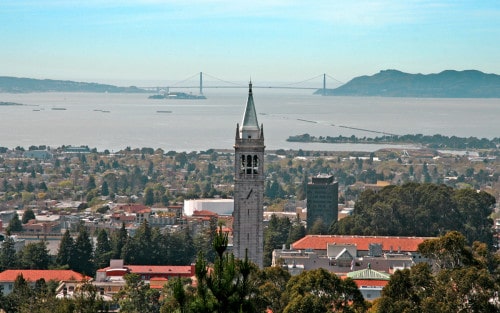San Francisco Bay Area Chapter: Improving Morale, Offerings
December 1, 2015
Ian RuderChapter Check-In

Tom Shankle had no aspirations to run a support group or manage a chapter of United Spinal Association when he started attending a monthly spinal cord injury support group in Berkeley, Calif., back in 2010. On the heels of a long career in the health care industry, Shankle had recently started Apple West Home Medical Supply. The monthly support group, then held in the basement of a local hospital, offered an opportunity for Shankle to connect with and learn about the community he wanted to serve.
“I started going every month,” he recalls. “I never said a word, I never recruited anybody. Over a four-year period I made a lot of friends, everyone knew me. When the leader stepped down, the group was going to dissolve. No one wanted to take it over, so I said, ‘Hey do you mind if I take it over?’”
And with that, Shankle took the helm in 2013. Soon after, he signed on to affiliate the group with United Spinal. Walter Delson, a para who lives and works in Berkeley, later signed on to help lead the chapter. Together the two friends are working to grow the chapter’s numbers and offerings.
The first thing Shankle did was find a new home for the group’s regular meetings. While the group had survived more than 10 years in the basement at Alta Bates hospital, Shankle thought the location might be hurting turnout and morale. “I didn’t like meeting at a hospital,” says Delson. “Life after SCI is about moving beyond the identity of injury associated with hospitals. I wanted to meet with my peers in the community, so I suggested the Ed Roberts Campus.” The group didn’t have any money, but Shankle’s company, Apple West, footed the bill to rent a space in the Ed Roberts Campus, a known hub of disability-related organizations and events, and to pay for some regular food and drinks for attendees. The group regularly draws 10-15 attendees and meetings often run into the wee hours of the night, as people share their stories and discuss what’s going on in their lives.
Aside from the support group, the chapter’s first big offering is a series of scholarships for advanced gait training at a local accessible exercise facility. Partnering with United Spinal, the chapter worked with SCI-FIT to give local people with spinal cord injuries a chance to use some of the most cutting edge rehab equipment and receive personalized instruction from SCI-FIT’s trained staff. That includes access to the Lokomat Nanos and the Robomedica StepGain-GRF, two of the leading gait training machines.
“The scholarships are a great way to help expose people from our community to the latest and greatest when it comes to rehab technology. A lot of people are interested in this but can’t afford it,” says Delson. “Hopefully it can help some people make functional gains that will improve their quality of life.”
To that end, Shankle and Delson also hope to eventually open an accessible gym with exercise equipment tailored towards people with disabilities. They recently secured the first piece of accessible workout equipment, donated by Reggie Bennett, the head of Rebuilding All Goals Efficiently, the Las Vegas chapter of United Spinal. “We’re not looking to make money off of people with spinal cord injuries or disabilities. We’re hoping to get more grant funding so we don’t have to charge for admission or membership,” says Delson. Right now they envision using part of a property owned by Shankle’s company for the gym, but they both say the plans are fluid.
Meanwhile, the pair hopes to keep growing the turnout for the support group and plan more social events to bring the community together. To find out more about the chapter’s gait training scholarships, visit unitedspinal.org/pdf/scholarship.pdf or call 510/868-9175.
Spotlight: Bay Area
by Walter Delson and Tom Shankle

My Take
Berkeley, Calif., is known as the birthplace of the disability rights movement. It was the first U.S. city to include curb cuts at intersections, which are now common in U.S. cities. University of California, Berkeley, affectionately known by locals as Cal, was the first public university in California.
The San Francisco Bay Area Chapter of United Spinal holds its meetings at the Ed Roberts Campus, which is named in honor of the first person with a significant physical disability to graduate from the University of California. Ed Roberts went on to open the first Center for Independent Living in the U.S., and was active in the disability rights movement throughout his life. Built according to principles of Universal Design, the Ed Roberts Campus houses diverse nonprofit organizations serving the disability community and is located above the Ashby BART station.
Skinny on the Area
Since the 1960s, the San Francisco Bay Area has been famous for a tradition of cultural diversity and progressive politics, including the disability rights/independent living movement. In addition to the mix of intellectualism and free-spirited expressiveness, the Bay Area has a near-perfect climate year-round, and abundant natural beauty.
Places to Go
Golden Gate Park is as beautiful as you think, and you should go there if you are in San Francisco or nearby. Redwood Regional Park in Oakland and Tilden Park in Berkeley have groves of magnificent coastal redwood trees. All parks feature accessible trails and sometimes paved paths.
The Berkeley Marina offers beautiful views of San Francisco, the Bay, and the Golden Gate Bridge. There is an accessible path along the water around the perimeter of Cesar Chavez Park, and out onto the nearby fishing pier.
The Bay Area offers a museum for everyone: the San Francisco Museum of Modern Art, the Asian Art Museum and the Walt Disney Family Museum; east of the Bay, Oakland Museum of California offers exciting exhibits with special focus on California artists and history; and Berkeley Art Museum and Pacific Film Archive is home to one of the largest film archives in the world!
Getting Around
In the Bay Area, you can get around independently in a wheelchair, with or without a car. In the downtown and arts districts, driving and parking can be stressful and challenging. A car is helpful for accessing parks and natural spaces, or other areas in “the hills.”
The preferred way to get around is Bay Area Rapid Transit, more commonly referred to as “BART.” BART connects San Francisco, Oakland, Berkeley and various other cities around the Bay. Every BART car and doorway is accessible and barrier-free, and there are elevators at every station. Occasionally an elevator will go out of service, but there is system-wide communication when this happens.
AC Transit in Berkeley and surrounding cities, and MUNI in San Francisco, offer bus options on either side of the Bay.
Easy Does It
If catastrophe strikes while in Berkeley you can call Easy Does It, a unique local non-profit that serves the elderly and people with disabilities. Easy Does It provides emergency attendant, transportation, and wheelchair repair services. So if your attendant gets sick or goes AWOL, you get stuck without a ride or your wheelchair breaks down, all you need to do is call the 24-hour hotline and someone will come out to help you. The service is funded entirely by Berkeley property taxes and costs $13 for the first hour or the call out.
Must See, Must Do
Ohlone Greenway is Berkeley’s pedestrian superhighway, which is paved and includes painted lanes and scaled-down stop signs at intersections. The Greenway is level, and well-maintained. It’s a great place to practice handcycling or wheelchair mobility.
Conveniently located along the Greenway is Westbrae Biergarten. The chicken tortilla soup and the empanadas are delicious, there are accessible tables and a kids’ play area, and the restrooms are downright luxurious. All this in addition to an ever-changing selection of tasty local brews.
Support New MobilityWait! Before you wander off to other parts of the internet, please consider supporting New Mobility. For more than three decades, New Mobility has published groundbreaking content for active wheelchair users. We share practical advice from wheelchair users across the country, review life-changing technology and demand equity in healthcare, travel and all facets of life. But none of this is cheap, easy or profitable. Your support helps us give wheelchair users the resources to build a fulfilling life. |


Recent Comments
DINOS PITSILLIDES on Functional Fitness: How To Make Your Transfers Easier
Stosh on Functional Fitness: How To Make Your Transfers Easier
Bill on LapStacker Relaunches Wheelchair Carrying System